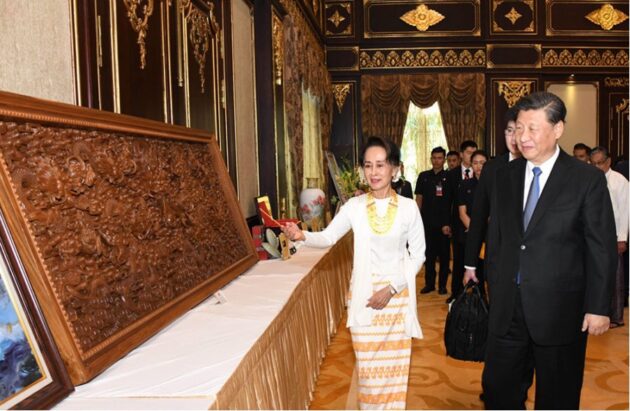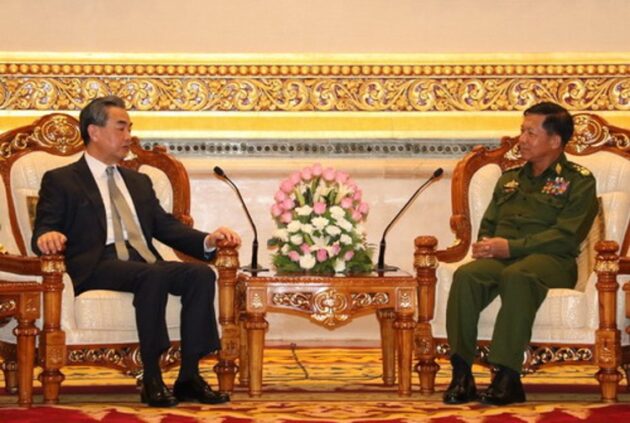10th July 2021
I mentioned yesterday about a report that I was putting together ready for today that would raise a few eyebrows. I have managed to get confirmation of the details from other sources and there are indications that there are changes blowing in the wind. There is a lot of “testing the waters” going on in Myanmar’s diplomatic circles.
China has historically been wary of the Military and vice versa, as the Chinese have at the least turned a blind eye to EAO activities on their border with Myanmar and at the most provided active support, logistically and with supplies. They didn’t trust the military because they were corrupt, always wanted their participation in developments and often changed the goalposts in deals.
When Daw Aung San Suu Kyi came to power, she started to develop better trading and development projects with the Chinese and slowly moved away from the West towards China. This was partly because the West overplayed their hand regarding the Rohingya and undermined her position against the military. China, not having the same scruples built on this and developed a trust with Aung San Suu Kyi whereby commitments from both sides were honoured and there was no gouging, skimming, or awarding of contracts to cronies.

Politicians from the ousted National League for Democracy (NLD) who have stayed in touch with Chinese officials since the Feb. 1 coup say Beijing was convinced in advance of the Myanmar military’s intention to overthrow the country’s elected government. These NLD figures—who have remained largely aloof from the activities of the shadow National Unity Government (NUG) set up by ousted MPs and others—also say that Beijing was sceptical from the outset of the military’s flimsy rationale for the takeover and believe that China is rapidly losing confidence in coup maker Min Aung Hlaing’s ability to assert full control over the country. And with the violence and instability in Myanmar worsening by the day, they are increasingly asking themselves why Beijing did nothing to prevent the coup in the first place.
Moreover, this group is convinced that China would still support a scenario in which the junta reined in its violence and entered into negotiations with ousted government leaders.
In the days following the military’s seizure of power, Myanmar activists and others in the country began almost immediately to express dismay at Beijing’s failure to condemn the coup, and the country witnessed its largest anti-China protests in decades. Many now say it will take years to repair the damage done to China’s image in the eyes of the Myanmar people.
(Aside from China, it is worth asking who else had intelligence that a coup was imminent in Myanmar. Several embassies with networks in Myanmar are highly likely to have had such knowledge.)
I know of three that were concerned about the possibility of action following the election and one NGO that reported back to their embassy.
Well-informed sources and some mid-ranking NLD officials told The Irrawaddy they believe Chinese leaders including Foreign Minister Wang Yi had concerns following November’s election, and even earlier, that a coup was inevitable. These sources say the Chinese knew it was coming and had reservations about the military’s motivations—but did nothing to prevent it.
In the second week of January, Wang Yi, China’s foreign Minister had a meeting with President U Win Myint and de facto leader and State Counsellor Daw Aung San Suu Kyi in Naypyitaw.
But no Western visitors met the protagonists.
The visit was seen as highly significant; Wang was the most senior Chinese official to visit Myanmar since the NLD’s landslide victory in November’s general election.
The Chinese Ministry of Foreign Affairs stated that Wang’s visit demonstrated “China’s anticipation and support for the successful formation of Myanmar’s new government as well as Myanmar’s efforts to realize national rejuvenation and lasting peace and stability along the development path independently chosen by the country and in the long-term interests of the people of Myanmar.”
Senior General Min Aung Hlaing, who was then—unbeknown to the wider world—preparing to stage his coup, also met the Chinese foreign minister.

To the surprise of Wang and other Chinese officials, the senior general took the opportunity to share the military’s “findings” from its examination of the country’s voter lists, saying it had uncovered mistakes and inaccuracies that could have led to opportunities to vote “more than once” and “voting malpractice”. (Min Aung Hlaing also shared his views with Yohei Sasakawa, the chairman of Japan’s Nippon Foundation, as well as Russian officials. Sasakawa is said to be viewed as a “godfather” figure by Min Aung Hlaing.)
The senior general also told Wang that Daw Aung San Suu Kyi was corrupt and informed the visiting Chinese official of his suspicions of malpractice at the State Counsellor’s Daw Khin Kyi Foundation, as well as his belief that she had mismanaged election funds.
Knowing Myanmar generals’ history of corruption and greed, the Chinese were bemused but listened. However, some military officers who attended the meeting recalled that it was clear from the Chinese minister’s body language that he did not agree with several of Min Aung Hlaing’s accusations.
Finally, Snr-Gen Min Aung Hlaing told the Chinese officials that the popularity of the NLD was on the decline, totally ignoring the fact that the party had won another landslide victory in the general election just two months earlier.
However, China had formed a different view even prior to the November election. Beijing foresaw that the NLD would win again, but they also saw that the military wouldn’t accept such an outcome. The question Beijing faced was, if a serious political conflict arose, with whom would China side?
Prior to the election, China had clearly been betting on the NLD and Daw Aung San Suu Kyi.
At the time, some Chinese officials accompanying Xi confided to Myanmar observers that Beijing believed in Daw Aung San Suu Kyi, as she kept her promises on Chinese investments and projects and felt that Myanmar would be better off if she won a second term.
What about Myanmar’s generals? Chinese officials commented at the time that the Tatmadaw’s top brass were corrupt and unreliable. This is clear evidence of the mutual distrust between Myanmar’s military leaders and Beijing.
Indeed, the generals in Naypyitaw have long been wary of China’s influence over the ethnic rebels and its interference. The irony is that Beijing publicly advocates a non-interference policy while heavily backing ethnic rebels in Myanmar’s north.
For the two years prior to the coup Senior General Min Aung Hlaing had expressed concern over Beijing’s support for groups based along the northern border in the form of arms sales. These ethnic rebel groups were in China’s pocket; proof could be seen in the numerous statements they issued on welcoming Xi’s visit to Myanmar in January 2020.
Now, Xi will have to decide what sort of relationship he wants with coup leader Min Aung Hlaing.
NLD politicians have confidentially asked China to do more to stop the violence and warned that if Myanmar collapses into chaos there would be significant destabilizing impacts on its neighbours, posing a strategic headache for China, India and Thailand.
At the same time, Chinese officials are increasingly worried that the anti-junta movement, including the Civil Disobedience Movement (CDM), the Committee Representing Pyidaungsu Hluttaw (CRPH) and the NUG are being funded by Western NGOs and donors.
Some NLD politicians who claim to have nothing to do with the NUG and CRPH say Beijing is losing its confidence in coup maker Min Aung Hlaing.
Their reasoning goes like this:
If Snr-Gen Min Aung Hlaing had succeeded in staging the coup and consolidating power, China wouldn’t be much bothered. Beijing would simply adjust and work with the new regime. Today, the Myanmar military is still trying to consolidate its grip on power amid sustained resistance.
After months of protests, violence, chaos and instability, and with humanitarian and health crises looming, the regime’s allies including China are unsure how to support Min Aung Hlaing. At the outset, Myanmar’s military leaders assured the Chinese, Japanese and key allies that they would be able to contain the anti-coup uprising but failed to anticipate the scale of the resistance.
Moreover, China was never convinced by Snr-Gen Min Aung Hlaing’s accusation of corruption against Daw Aung San Suu Kyi and the Daw Khun Kyi Foundation. China has made its own assessment of these cases and found nothing irregular, according to informed sources in Yangon. One NLD politician summed up the feeling: “The trouble with Min Aung Hlaing is, he was in the wrong from the start.”
Thus, China has lost confidence in Snr-Gen Min Aung Hlaing. Its view is that under his rule, Myanmar will only see more trouble and a prolonged period of instability.
China remains one of the biggest investors in Myanmar, having signed several major Belt and Road Initiative projects with the ousted government. Bejing’s political influence in Myanmar is not insignificant.
China knows its geostrategic interests will be threatened if Myanmar’s generals fail to successfully assert full control, and that the country is in danger of descending into full-scale civil war and chaos.
Beijing is the only capital that can intervene and put real pressure on the junta to refrain from violence and negotiate with the ousted government stated some key NLD leaders who developed close relations with Chinese officials over the past five years.
Source The Irrawaddy 10th July 2021.
Beijing is seriously looking at its options and wants stability sooner rather than later and if that means supporting an internal coup amongst the military, then so be it. Its investments in Myanmar are being slowly destroyed and its BRI projects are in jeopardy, with its access to Indian Ocean ports under pressure.
Ultimately, NLD politicians and some analysts in Myanmar are convinced that China still wants to see mediation and some form of negotiation between the coup maker and the detained NLD leaders, including Daw Aung San Suu Kyi. China is trying to exploit the situation in Afghanistan and put pressure on the USA and Japan over Taiwan, and the last thing it needs is an armed struggle on its borders with the potential to cause problems in Thailand and India. China is getting weary and tired of Min Aung Hlaing.
Please share this article so that others can discover The BFD

